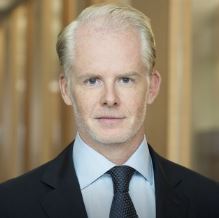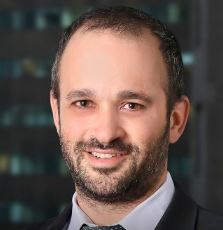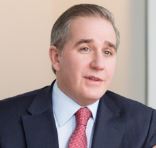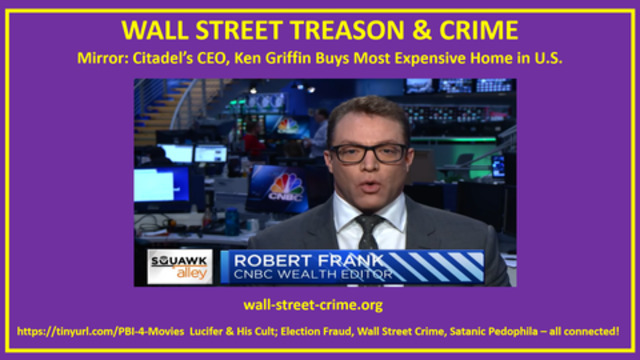 Daniel Dufresne is Global Head of Counterparty Strategy at Citadel. He joined Citadel in 1999. Dufresne has been a member of the Treasury Borrowing Advisory Committee (TBAC) since 2015, where he now serves as Vice Chair. He previously served 11 years on the Treasury Market Practices Group (TMPG) and was a member of the Task Force on Tri-Party Repo Infrastructure which began in 2009. He received a Master of Business Administration, with Honors, from the University of Chicago Booth School of Business and a bachelor’s degree from Cornell University.
Daniel Dufresne is Global Head of Counterparty Strategy at Citadel. He joined Citadel in 1999. Dufresne has been a member of the Treasury Borrowing Advisory Committee (TBAC) since 2015, where he now serves as Vice Chair. He previously served 11 years on the Treasury Market Practices Group (TMPG) and was a member of the Task Force on Tri-Party Repo Infrastructure which began in 2009. He received a Master of Business Administration, with Honors, from the University of Chicago Booth School of Business and a bachelor’s degree from Cornell University.
Subject: Ed O’Reilly
Subject of Interest Ed O’Reilly is a Senior Managing Director and Global Head of the Client and Partner Group at Citadel. O’Reilly started his career at The O’Connor Partnership, Chicago. USB Throughout his career with O’Connor / Swiss Bank Corporation / UBS, he was based in a variety of financial centers: Chicago, Singapore, Zurich and London. O’Reilly is a member of The Economic Club of New York, The Aspen Institute Society of Fellows and The Development Board for the Brunswick School in Greenwich, Connecticut. He is also Chairman of the North American Standards Board for Alternative Investments. Mr. O’Reilly received his Master of Business Administration from Duke University.
Ed O’Reilly is a Senior Managing Director and Global Head of the Client and Partner Group at Citadel. O’Reilly started his career at The O’Connor Partnership, Chicago. USB Throughout his career with O’Connor / Swiss Bank Corporation / UBS, he was based in a variety of financial centers: Chicago, Singapore, Zurich and London. O’Reilly is a member of The Economic Club of New York, The Aspen Institute Society of Fellows and The Development Board for the Brunswick School in Greenwich, Connecticut. He is also Chairman of the North American Standards Board for Alternative Investments. Mr. O’Reilly received his Master of Business Administration from Duke University.
Subject: Perry Vais
Subject of Interest Perry Vais is the Global Treasurer at Citadel. He oversees the firm’s core Treasury function including central funding strategy and execution. Perry is a member of Citadel’s Portfolio Committee. Perry joined Citadel in 2019 as Head of Treasury Analytics. Prior to joining the firm, he spent 13 years at Blue Mountain where he served in a number of key leadership positions, including Head of Trading Technology, Co-Head of Risk Management, Head of Quantitative Strategies, Chief Technology Officer and Head of Systematic Investing. Perry received a bachelor’s degree in Computer Science from Binghamton University.
Perry Vais is the Global Treasurer at Citadel. He oversees the firm’s core Treasury function including central funding strategy and execution. Perry is a member of Citadel’s Portfolio Committee. Perry joined Citadel in 2019 as Head of Treasury Analytics. Prior to joining the firm, he spent 13 years at Blue Mountain where he served in a number of key leadership positions, including Head of Trading Technology, Co-Head of Risk Management, Head of Quantitative Strategies, Chief Technology Officer and Head of Systematic Investing. Perry received a bachelor’s degree in Computer Science from Binghamton University.
Subject: Shawn Fagan
Subject of Interest Shawn Fagan is Chief Legal Officer of Citadel, responsible for Citadel’s global legal, compliance, transaction management, and regulatory affairs functions. Shawn is a member of Citadel’s Portfolio Committee. Prior to joining Citadel in 2005, Shawn was a Partner at Bartlit, Beck, Herman, Palenchar & Scott. Previously, he served as a clerk for Chief Justice William Rehnquist of the U.S. Supreme Court and Judge Douglas H. Ginsburg of the U.S. Court of Appeals for the District of Columbia. Shawn serves on the Board of Directors for the U.S. Chamber of Commerce and the Program on International Financial Systems (PIFS). He graduated with honors from the University of Michigan with a B.A. in Political Science and holds a J.D., magna cum laude, from Harvard Law School.
Shawn Fagan is Chief Legal Officer of Citadel, responsible for Citadel’s global legal, compliance, transaction management, and regulatory affairs functions. Shawn is a member of Citadel’s Portfolio Committee. Prior to joining Citadel in 2005, Shawn was a Partner at Bartlit, Beck, Herman, Palenchar & Scott. Previously, he served as a clerk for Chief Justice William Rehnquist of the U.S. Supreme Court and Judge Douglas H. Ginsburg of the U.S. Court of Appeals for the District of Columbia. Shawn serves on the Board of Directors for the U.S. Chamber of Commerce and the Program on International Financial Systems (PIFS). He graduated with honors from the University of Michigan with a B.A. in Political Science and holds a J.D., magna cum laude, from Harvard Law School.
Subject: Umesh Subramanian
Subject of Interest Umesh Subramanian is the Chief Technology Officer at Citadel. Prior to joining Citadel, he spent 13 years at Goldman Sachs, most recently serving as a Partner and Co-Head of the Technology Division. While at Goldman Sachs, Subramanian was a member of the Board of Directors of the Depository Trust and Clearing Corporation. Before that, Subramanian worked at Morgan Stanley. Subramanian serves on the NYU Stern Tech MBA Advisory Board. He received a BTech in Mechanical and Industrial Engineering from the Indian Institute of Technology, Madras, and an MS in Industrial Engineering and Operations Research from the University of Illinois at Urbana-Champaign.
Umesh Subramanian is the Chief Technology Officer at Citadel. Prior to joining Citadel, he spent 13 years at Goldman Sachs, most recently serving as a Partner and Co-Head of the Technology Division. While at Goldman Sachs, Subramanian was a member of the Board of Directors of the Depository Trust and Clearing Corporation. Before that, Subramanian worked at Morgan Stanley. Subramanian serves on the NYU Stern Tech MBA Advisory Board. He received a BTech in Mechanical and Industrial Engineering from the Indian Institute of Technology, Madras, and an MS in Industrial Engineering and Operations Research from the University of Illinois at Urbana-Champaign.
Article: Citadel Securities Pays $97m to Settle with China Regulators
Article - MediaCitadel Securities Pays $97m to Settle with China Regulators
Aziz Abdel-Qader
FinanceMagnates, 20 January 2020
Citadel Securities, one of the largest market makers in US stocks and options, has agreed to pay 670 million yuan ($97 million) to resolve a probe by China’s regulator into alleged trading rules violations. The Chinese securities regulator launched the five-year investigation in 2015 following a stock plunge that erased nearly $3.9 billion in the mainland metal market.
Comment: In the USA they are angels. How much did they steal?
Article: BofA Merrill Lynch Branch in Seoul Fined for High-frequency Trading
Article - MediaBofA Merrill Lynch Branch in Seoul Fined for High-frequency Trading
Yoon Young-sil
Business Korea, 17 July 2019
Korea Exchange (KRX) has decided to impose a 175 million won (US$148,495) fine on Bank of America Merrill Lynch’s South Korean unit for violating its trading rules. Merrill Lynch’s Seoul branch reportedly served as a trading channel for U.S.-based Citadel Securities and has been suspected of disrupting the market through high-frequency algorithm trading on the KOSDAQ market.
Article: Merrill Lynch fined by Seoul authority for profiteering from spoofing
Article - MediaMerrill Lynch fined by Seoul authority for profiteering from spoofing
Chung Seung-hwan, Choi Mira
Pulse, 17 July 2019
South Korea’s stock exchange authority Korea Exchange (KRX) slapped a fine of 175 million won ($148,242) on U.S. brokerage Bank of America Merrill Lynch for violating domestic rules and distorting market through algorithmic high-frequency spoofing.
Merrill Lynch has been accused of abetting 6,200 spoofing activities while handling 80 trillion won worth deals commissioned by American hedge fund Citadel Securities from October 2017 to May 2018. Over the period, Citadel was found to have profiteered about 220 billion won, according to KRX.
Article: Merrill Lynch faces sanctions for extreme scalping role in Korea
Article - MediaMerrill Lynch faces sanctions for extreme scalping role in Korea
Yoo Joon-ho, Lee Eun-joo
Pulse, 18 June 2019
U.S. brokerage Bank of America Merrill Lynch is facing possible disciplinary action from South Korea’s stock exchange authority for its alleged role in market-disrupting high-frequency trading on behalf of U.S. Citadel Securities.
Korea Exchange, the country’s stock exchange operator, said on Tuesday that it will convene a market monitoring committee on Wednesday to determine the level of punishment against Merrill Lynch. The action may include warnings, stern warnings and financial penalties.
Video: Citadel CEO buys $122 million London mansion
VideoCitadel CEO buys $122 million London mansion

CNBC’s Robert Frank reports on Citadel CEO and Founder Ken Griffin’s purchase of a $122 million home in London.
Release: Explains Illegal Naked Shorting Being Perpetrated By Major Market Makers on MAXD Shares
ReleaseExplains Illegal Naked Shorting Being Perpetrated By Major Market Makers on MAXD Shares
8,117,878,650 shares shorted in the past year, which is more than 40% of MAXD’s total trading volume
We have analyzed the last year of daily short volume data and correlated it to recent market making activity in MAXD. In 27 of the past 31 trading days, 87% of the time, the combined selling and short selling in MAXD has far exceeded the amount of buying (See NetNet column below). Market makers, by definition, are required to PROVIDE LIQUIDITY not extract or remove liquidity. The math provided below demonstrates that instead of matching orders, market makers, Knight/Virtu, Cantor Fitzgerald, Canaccord Genuity, Citadel, eTrade/G1 are heavily shorting MAXD stock BOTH on the offer and on the bid, which by definition means they have a “speculative short selling strategy” running on MAXD. They are carrying net short positions overnight and continuing to claim the market maker’s exemption, which is in VIOLATION of the Fair Market Making Requirements of Regulation SHO. We are able to mathematically prove this because there is not enough BuyVol (buy volume) to match the amount of selling and short selling. The chart below identifies the top 5 market makers, in MAXD for May 2018 (highlighted below) accounting for 2,257,870,595 shares of trading, or 88.22% of total trading volume in May.
Total Volume Name
(Last Month)
643,662,180 Knight/Virtu,
154,447,100 Cantor Fitzgerald,
203,762,081 Canaccord Genuity,
769,731,954 Citadel,
247,276,817 Trade/G1
As is common during these orchestrated short selling campaigns, bad actors with no real interest in MAXD’s success, or any small public company for that matter, has consistently engaged in false accusations and libel on the Company’s stock chat boards in attempts to scare and demoralize MAXD’s legitimate shareholders. It is noteworthy that as soon as Max Sound sent this report to the market makers perpetrating the naked short sales on the company, the bad actors disappeared at least for the time being.
